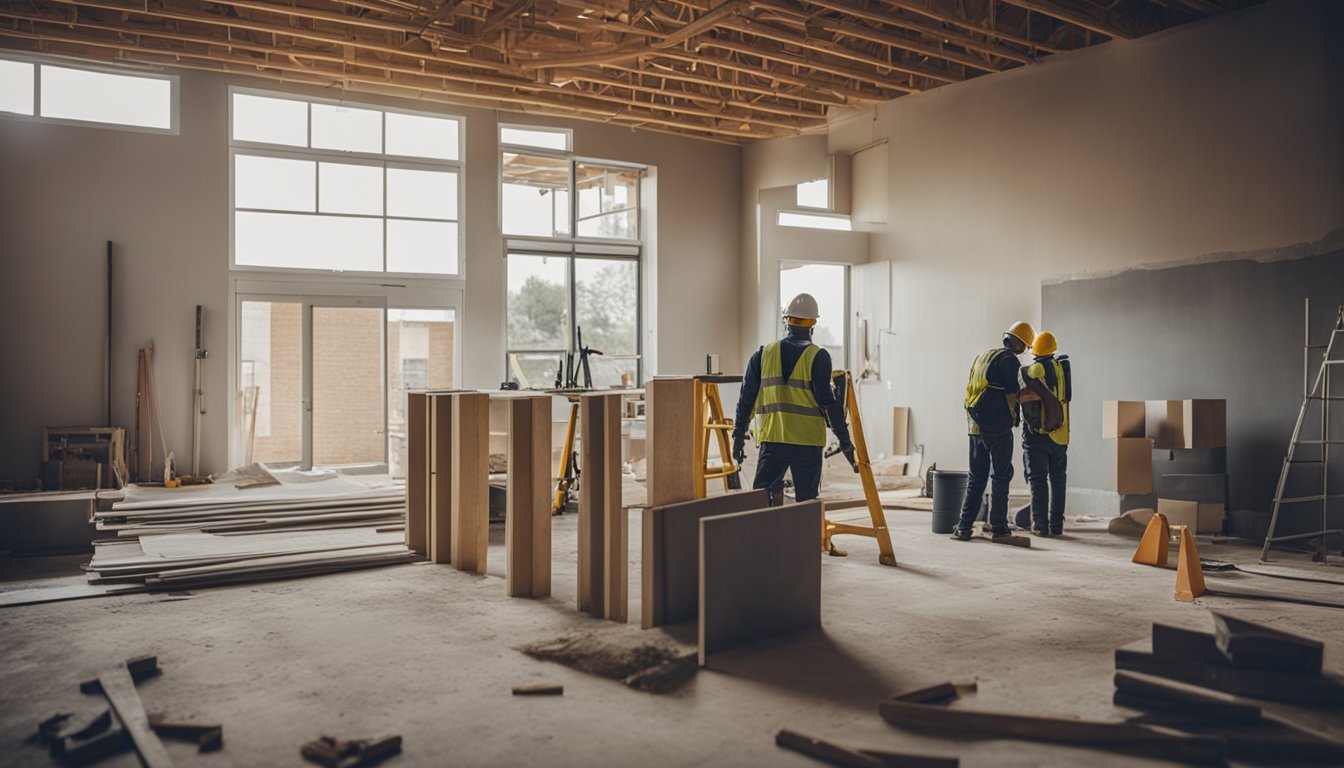Late updated: 05 Aug 2024 13:08
Written by: Daniel Harper
Creating A Renovation Schedule For Your Home: A Step-by-Step Guide
Renovating a home can be an exhilarating yet challenging endeavour. To ensure success, creating a comprehensive renovation schedule is essential. By meticulous planning and timely execution, we can transform our vision into reality while avoiding unforeseen hiccups.

Foremost, it’s vital to establish the groundwork. Assessing the condition of key elements such as the foundation, electrical systems, and plumbing is paramount. Identifying potential issues early can save us a significant amount of time and money down the road. With a clear understanding of the project’s scope, setting a realistic budget and timetable becomes more manageable.
Communication remains at the heart of any successful renovation. By distributing weekly action lists with clear deadlines, we ensure that everyone knows their role. This level of organisation not only keeps the project on track but also minimises stress for all involved parties.
Key Takeaways
- Creating a detailed renovation schedule is crucial for success
- Assessing foundational elements early prevents costly issues
- Clear communication and organisation streamline the renovation process
Planning Your Home Renovation
Creating a detailed renovation plan is essential for any successful project. Establishing a budget, choosing a reliable contractor, precise design planning, and securing necessary permits and materials are fundamental steps to ensure your renovation proceeds smoothly.
Establishing a Realistic Budget
First, we need to set a realistic budget which includes all projected costs. This should cover materials, labour, permits, and unexpected expenses. Begin by outlining the renovation's scope of work, making a detailed list of all tasks.
Consult with professionals to get estimates and compare these with average costs in the industry. Always include a contingency budget—typically 10-15% of the total budget—for unplanned expenses. It's crucial to explore financing options, such as home improvement loans, if necessary.
Choosing the Right Contractor
Selecting a contractor requires careful consideration and thorough research. Look for contractors with strong references, proper certifications, and valid insurance. We should solicit multiple bids and compare them not just on price, but also on the scope of work and timeline they propose.
Communication is key. Ensure the contractor is approachable and transparent about project details. It's beneficial to draft a detailed contract covering all aspects—timeline, costs, and specific work descriptions—to avoid misunderstandings later.
Design and Planning
Effective design and planning are the backbone of any renovation. Collaborate with architects or interior designers to create detailed plans. These plans should clearly define the changes and the materials required.
Feasibility studies are sometimes necessary to understand structural changes. We may need a structural engineer to assess the feasibility of removing walls or other major alterations. Detailed planning will help avoid surprises and keep the project within budget and on schedule.
Securing Permits and Materials
Securing the necessary permits and materials is a critical step often overlooked. The permits you need will depend on the scope of your project and local regulations. Research or consult with your contractor to determine which permits are required.
Gathering materials involves more than just ordering supplies. We must ensure that the materials meet our specifications and are available within our timeline. Delays in material shipments can halt work and extend the overall project duration. Make sure all documentation is in order to avoid legal issues or project delays.
Executing the Renovation Works

Executing the renovation involves careful planning and coordination among various tasks, including demolition, interior and exterior works, and finishing touches. Proper execution ensures the renovation progresses smoothly and efficiently, ultimately enhancing the home's value and appeal.
Demolition and Structural Changes
During the demolition phase, we start by removing any outdated or damaged structures. This might include tearing down walls, flooring, old cabinets, or fixtures. It's crucial to handle this phase with precision to avoid damaging the foundation or framing.
Once demolition is complete, structural changes follow. This involves adding or removing walls, updating the layout, and making necessary alterations to the foundation. Coordination with a general contractor and various subcontractors, such as plumbers and electricians, is vital during this phase to ensure the integrity and safety of the building.
Interior and Exterior Works
Interior works encompass a variety of tasks, including installing new drywall, flooring, cabinets, and fixtures. Plumbing and electrical systems are updated or newly installed, and attention is given to the addition of new doors and windows. Painting and tiling are also critical steps at this stage, transforming the interior's appearance.
Exterior works might include updating or replacing the roof, siding, and external paint. Adding a deck or remodelling the landscaping can enhance curb appeal and outdoor functionality. Managing this phase effectively requires careful scheduling and coordination to minimise delays and ensure each task complements the others.
Finishing Touches and Cleaning
The finishing touches bring the project to completion. Installing trim, light fixtures, and final plumbing fittings like sinks, showers, and bathtubs adds to the functional and aesthetic appeal. Ensuring that flooring is laid correctly and painting touch-ups are finished contributes to a polished look.
Post-renovation cleaning is essential. Dust and debris must be removed from all surfaces, including walls, floors, and countertops. This involves a deep clean to make the space liveable and inviting. Proper cleaning not only boosts visual appeal but also highlights the quality of the renovations. Scheduling movers to rearrange furniture and final inspections ensures the project is concluded satisfactorily.
By systematically managing each phase and paying close attention to detail, we ensure the renovation is executed flawlessly, adding lasting value to the home.
Frequently Asked Questions

Planning a home renovation can be daunting. Knowing the initial steps, developing a timeline, following a logical sequence, and organising a comprehensive plan are essential.
What are the initial steps to planning a house renovation?
First, assess the current condition of your home. Identify the areas requiring the most attention. Develop a clear vision for your renovation goals. Set a realistic budget based on initial assessments. Research and consult with professionals if needed.
How can one develop an effective home renovation timeline?
Start by listing all renovation tasks. Assign realistic time frames to each task. Consider factors like material availability and contractor schedules. Break down the project into phases. Use project management tools to track progress and stay on schedule.
What is the logical sequence for remodelling a home?
Begin with planning and design. Next, handle demolition and structural repairs. Follow up with electrical, plumbing, and HVAC work. Proceed to drywall, flooring, and painting. Finish with cosmetic touches and final inspections.
How do you organise a comprehensive home renovation project plan?
Draft a detailed renovation plan. Include timelines, budgets, and task responsibilities. Communicate with all involved parties. Be prepared for adjustments. Maintain open lines of communication to ensure everyone stays informed. Document every decision and purchase.
Can you provide a checklist for a step-by-step house renovation?
- Assess and plan
- Set a budget
- Hire professionals
- Obtain permits
- Demolish and clean up
- Structural repairs
- Install systems (electrical, plumbing, HVAC)
- Insulation and drywall
- Flooring and painting
- Final touches
What resources are available for someone renovating a house without prior experience?
We recommend consulting guides and tutorials from reputable sources. Join online forums and communities for advice and support. Consider taking short courses or workshops on home renovation. Partner with experienced professionals for critical tasks. Use project management apps to stay organised.
